Suchergebnisse für "Factsheet: Energietechnologien gestalten, die für alle sinnvoll und nutzbar sind"
Piezo-Klett: Entwicklung piezoelektrischer Klettanwendung zur Energieversorgung aktiver Sensorik im Bauwesen
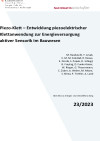
Das vorliegende Projekt betrachtet Gebäude, Gebäudeteile und ihre Anschlüsse (Bauteilknoten) als Energiegeneratoren, indem durch die Anwendung der Klettverbindung in Kombination mit dem piezoelektrischen Effekt ein so genanntes Energy Harvesting betrieben wird.
Schriftenreihe
23/2023
M. Raudaschl, T. Levak, V. M. M. Soledad, R. Riewe, E. Drnda, S. Popek, D. Schlegl, B. Freytag, D. Funke-Kaiser, W. Rieger, G. Theuermann, C. Zuber, A. Weber, M. Moser, S. Klima, P. Treitler, A. Lund
Herausgeber: BMK
Deutsch, 89 Seiten
Downloads zur Publikation
LooPi BETA VERSION. LooPi - das autarke unisex Pflanzen Urinal für den öffentlichen Raum. Beta Version.
Einsatz des Prototyps in Betriebsumgebung über einen Zeitraum von 20 Monaten. Technisches Monitoring über den Jahreszeitenzyklus, sowie NutzerInnenbefragungen zur Zufriedenheit, und Erhebung des möglichen Einsatzes von LooPi-Materialströmen zur Bodenverbesserung im biologischen Landbau. Ergebnisse dienen der Entwicklung zur Marktreife.
SURO - Der städtische Untergrund als Rohstoffmine? Potential an Sekundärressourcen in der erdverlegten Infrastruktur
Machbarkeit eines Ressourcenkatasters zur Inventarisierung, Charakterisierung und Verortung der Materialbestände in den erdverlegten Infrastrukturnetzwerken österreichischer Stadtregionen. Das Ergebnis dient der ökonomischen Bewertung von Sekundärrohstoffpotenzialen.
Urbaner Kältebedarf in Österreich 2030/2050 (UKÖ 2030/2050)
Systematische Aufarbeitung des steigenden Kühlbedarfs und Darstellung der geographischen Verortung des Kältebedarfs in Österreich. Das Ergebnis dient als Entscheidungshilfe bei der Entwicklung von Klimaschutzmaßnahmen und Klimawandelanpassungsstrategien sowie eine Abschätzung zum Kältebedarf der Zukunft.
Smart Cities Summerschool - 4 Public Lectures
23., 25. und 27. August 2016
Wien (verschiedene Locations)
Im Rahmen der Summer School "Smart Cities – Designing Places & Urban Mentalities" öffnen vier Public Lectures der breiten Öffentlichkeit das Spannungsfeld zwischen interdisziplinärer Kooperation und wissenschaftlichem Austausch in den Bereichen Stadtplanung, Soziologie, technologiegetriebener Innovation und Informatik.
Smart Energy Systems / SESWA - Award
Im Rahmen der Smart Energy Systems Week wird der "Smart Energy Systems Award“ in vier Kategorien vergeben und zeichnet neben herausragenden wissenschaftlichen Arbeiten und Forschungsprojekten auch konkrete Demonstrationsvorhaben und Start Ups aus.
Umsetzung regionaler Elektromobilitätsversorgung durch hybride Kopplung (Move2Grid)
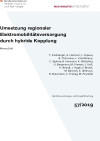
Aufbauend auf den Ergebnissen der „Stadt der Zukunft“ Sondierungsprojekte „Smart Exergy Leoben“, und „Energieschwamm Bruck“ soll im gegenständlichen,umsetzungsorientierten Forschungsvorhaben anhand des Beispiels Leoben untersucht werden, wie mit regionalen, erneuerbaren Ressourcen regionale Elektromobilität langfristig versorgt, optimal ins kommunale Verteilernetzsystem integriert und ökonomisch nachhaltig implementiert werden kann.
Schriftenreihe
57/2019
T. Kienberger, A. Hammer, J. Vopava, B. Thormann, L. Kriechbaum, C. Sejkora, R. Hermann, K. Watschka, U. Bergmann, M. Frewein, J. Koß, H. Brandl, J. Vogel, S. Moser, M. Baresch, K. de Bruyn, R. Braunstein, C. Freitag, M. Peyreder
Herausgeber: BMVIT
Deutsch, 172 Seiten
Downloads zur Publikation
Langzeitevaluierung des Energieverbrauchs von 100 energieeffizienten Gebäuden in Österreich als repräsentativer Querschnitt österreichischer Leuchtturmobjekte (LZE 100 Leuchtturmobjekte)
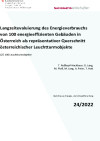
Erfassung, Auswertung und Analyse von Energieverbrauchsdaten von 100 energieeffizienten Gebäuden in Österreich über eine Betriebszeit von 3 bis 25 Jahren als repräsentativer Querschnitt der österreichischen Leuchtturmobjekte. Differenzierung nach Gebäudetypen, Energieträger und Ermittlung der realen Treibhausgas-Emissionen. Vergleich der gemessenen Verbräuche zu Benchmark-Werten.
Schriftenreihe
24/2022
T. Roßkopf-Nachbaur, G. Lang, M. Ploß, M. Lang, A. Peter, T. Hatt
Herausgeber: BMK
Deutsch, 143 Seiten
Downloads zur Publikation
Der städtische Untergrund als Rohstoffmine? Potential an Sekundärressourcen in der erdverlegten Infrastruktur
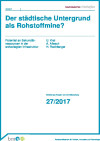
Machbarkeit eines Ressourcenkatasters zur Inventarisierung, Charakterisierung und Verortung der Materialbestände in den erdverlegten Infrastrukturnetzwerken österreichischer Stadtregionen. Das Ergebnis dient der ökonomischen Bewertung von Sekundärrohstoffpotenzialen.
Schriftenreihe
27/2017
U. Kral, A. Allesch, H. Rechberger
Deutsch, 73 Seiten
Downloads zur Publikation
Integration von Begrünung in den österreichischen Energieausweis (GREENergieausweis)
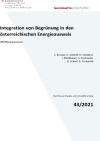
Anpassung der Berechnungsmodelle im Energieausweis derart, dass Gebäudebegrünung darin möglichst realistisch abgebildet werden kann und Abschätzung zur Akzeptanz einer Umsetzung bei relevanten Stakeholdern.
Schriftenreihe
43/2021
C. Kresser, E. Schriefl, H. Schöberl, I. Mühlbauer, S. Formanek, B. Scharf, G. Frühwirth
Herausgeber: BMK
Deutsch, 71 Seiten
Downloads zur Publikation
BIMstocks - Digital Urban Mining Platform: Assessing the material composition of building stocks through coupling of BIM to GIS
The main goal of BIMstocks is the development of a method for the digital capturing of the material composition of the existing building stock for follow up modelling of an Urban Mining Platform as well as for the prediction of the recycling potentials.
3D*3B - 3D-Concret Printing, Reinforcement for low carbon and bending stressed structures.
The project is about 3D printed structural elements and their integration in building structures. The focus is predominantly set on bending stresses structural elements like panels and slabs. Results will point out technical, logistic and climate relevant aspects.
RENOWAVE.AT - The innovation lab for sustainable, climate-neutral renovation of buildings and districts
RENOWAVE.AT will act as a central contact point for collaboration in innovation projects and provide systematic and early access to as well as promote innovative, scalable renovation concepts and sustainable renovation technologies within real development environments (open innovation principle).
M-DAB - Digitise, analyse and sustainably manage the city's material resources
The research project investigates how digital technologies can support us in determining the existing and future material resources in construction qualitatively (building materials and their recycling) and quantitatively (quantities of building materials).
BIMpeco - Environmentally relevant product data in collaborative BIM environments
Construction products can pose a risk to the environment and health due to their pollutant content or releases. In the BIMpeco project, workflows and data structures for digital information management of this environmentally relevant product data are developed. For this purpose, the new ISO standards ISO 23387 and ISO 19650-1 are tested and synchronized with established process flows. The project results will be made available on an open-source basis and can be integrated into any Common Data Environment (CDE) that complies with the standards mentioned. The BIMpeco project is the first to lay the foundations for product information management of environmentally relevant properties in the CDE, covering the entire lifecycle and supply chain.
NaNu3 - Parametric Planning for a Sustainable Roof (Blue, Grey and Green)
Demonstration of the feasibility and validation of a parametric model that can evaluate the practical and financial feasibility of the combined use of roof areas as well as its microclimate and environmental effectiveness at an early planning stage.
BIM2BEM Flow - Continuous BIM-based energy efficient planning
Automated integration and assignment of exchange requirements between the design and simulation programs, based on the elaborated exchange information requirements, should enable continuous energy efficiency planning along the design phase.
Green BIM - Green building infrastructure as part of BIM-based planning and maintenance
Fusion of greenery and BIM planning to achieve a friction-free conducting and maintenance. By analysing the case studies, “Green BIM” examined to what extent typical steps in planning regarding greened buildings can be edited by characteristic software programs in a BIM-equitable way. The expected outcomes are supplements to international standards for data structures in civil engineering (IFC / ISO 16739) which are further on added to BIM applications by the software industry.
Urban district heating extended – Development of flexible and decarbonized urban district heating systems
Development of innovative urban district heating systems by integration of long-term thermal storage, large scale heat pumps, large scale solar thermal installations, waste heat recovery and analysis and evaluation by simulation. The results of this project will provide templates for technology selection, system design and merit order for new urban district heating areas.
LivingMODELofTomorrow
Development of transparent, technical and economic models for medium and high volume residential buildings, with special focus on the non-profit sector. Topics such as generation living, teleworking as well as smart homes are developed in an integrated model, for dense structures as well as pavillons and townhouses. All models follow the three pillars of sustainability.
